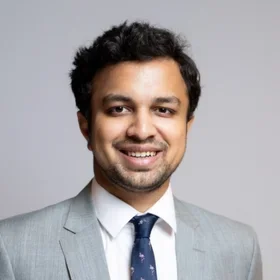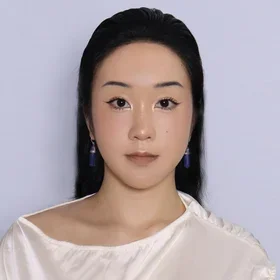JaVe Bonner (’24SPS, Narrative Medicine) is bringing together medicine, compassion, and creativity in order to solve social challenges and barriers in health care practices. Bonner credits Columbia’s M.S. in Narrative Medicine (NMED) program for teaching her how to cultivate her listening skills and appreciate the subtleties in people’s stories.
Bonner received support and guidance from her instructors in the NMED program to help her develop GeneHouse, an innovative app for documenting familial health histories. By providing a secure platform for medical information, Bonner believes, GeneHouse can bridge a significant gap between patients and providers.
“The support I received during the program helped me build confidence, overcome imposter syndrome, and gain the tools needed to approach patients and family members with empathy and support,” says Bonner.
How Science, Dance, and Personal Loss Led Bonner to Narrative Medicine
Growing up in Virginia, Bonner attended a performing arts high school with a focus on dance, but her path took a turn when she enrolled as a chemistry major at George Mason University, where she concentrated on biochemistry and minored in dance. During her freshman year, however, she lost her mother. It was a painful and profound experience that not only reshaped her life but also fueled her drive toward medicine.
As she continued her academic journey, she transferred to the University of the District of Columbia, where she completed a degree in chemistry. Influenced by the years she spent in and out of cardiology offices with her mother, her time working at the Howard University Cancer Center, and her love for both science and the arts, she decided to pursue an M.S. in Narrative Medicine. This unique field blends the arts and humanities with medicine, allowing health care providers to understand patients’ stories better and provide more compassionate care. For Bonner, this became not just an academic pursuit but a calling. “Through studying narrative medicine, I learned how to sit in my perspective, be okay with it, and share it,” says Bonner.
The Inspiration behind GeneHouse
Adopted at birth, Bonner has encountered several frustrations and roadblocks in medical care because of her lack of family health history. “Every time I filled out medical forms, I felt like my story was lost,” said Bonner. “My background isn’t simple. There are gray areas, but there was no space to express that nuance.”
Her experiences sparked a curiosity that ultimately led to the creation of GeneHouse, a platform for documenting familial health histories. The app aims to capture the nuances often missing from conventional medical questionnaires, like the complexities of familial and personal narratives and histories that affect health but aren’t easily conveyed through typical forms with yes-or-no questions. The app enables patients to enter their health information through open-text or voice entries, which GeneHouse’s genetic counselors then analyze to create a comprehensive assessment.
“Doctors don’t have the time to sit and digest everything patients share—that’s where GeneHouse steps in,” says Bonner. “I want GeneHouse to bridge the gaps in care by giving doctors concise, detailed patient narratives."
GeneHouse, Bonner explains, isn’t just about family health history collection; it’s about fostering trust in health care, especially with a Black community that has historically been justifiably wary of the medical system. She recognizes the critical role of patient confidence in health care and strives to ensure that GeneHouse’s data collection methods respect patients’ fears. “If patients feel protected, that makes them more vulnerable, and that gives them the space to say more,” says Bonner.
The role of GeneHouse extends beyond the individual patient level. Bonner also sees it as a tool for health care providers. By packaging relevant patient information through assessment by GeneHouse’s genetic counselors, the app can help doctors make informed decisions and avoid missing critical context in a patient’s care.
Bonner’s time in the Narrative Medicine program influenced the development of GeneHouse. Emphasizing the power of storytelling and patient-centered care, her courses and professors helped Bonner conceptualize how to turn personal stories into healthcare solutions. Exercises like writing illness narratives from multiple perspectives helped her further develop empathy for patients. With this deeper understanding, she was able to put herself in the shoes of potential GeneHouse users and improve details of the app experience.
The Future of GeneHouse
GeneHouse has taken years to develop, evolving from concept to design with the help of a designer who has brought Bonner’s vision to life. Now nearing beta testing, she has ambitious plans for GeneHouse’s future, including hopes for funding to fully launch the platform. “I want GeneHouse to be a one-stop shop for patients, from gathering information to getting genetic testing to finding the right care.”
Beyond her aspirations for GeneHouse, Bonner is also an advocate for health equity and data transparency. She hopes that GeneHouse can contribute to greater health equity by addressing the systemic biases that often affect marginalized groups. In discussing health care in America, she emphasizes the broader implications of policies on health equity, noting how socioeconomic factors, access to health care, and systemic support all play crucial roles in determining health outcomes.
Through GeneHouse, Bonner is making her mark on health care by creating something meaningful that supports and uplifts others. By combining her talents in storytelling, science, and patient advocacy, Bonner hopes, GeneHouse will continue to empower individuals and reshape health care narratives for years to come.
“I will always value the skills I learned in the Narrative Medicine program,” Bonner said. “My professors and peers reinforced my vision for GeneHouse and provided support through every step of the process. GeneHouse wouldn’t be what it is now if I hadn’t attended the program.”
About the Program
Columbia University’s Master of Science in Narrative Medicine prepares health professionals, writers, and scholars to apply the skills and values of narrative understanding to improve outcomes for both patients and caregivers. It offers a rigorous and in-depth study of close reading of creative texts, illness and disability narratives, narrative ethics, philosophy, creative writing, and other perspectives.


